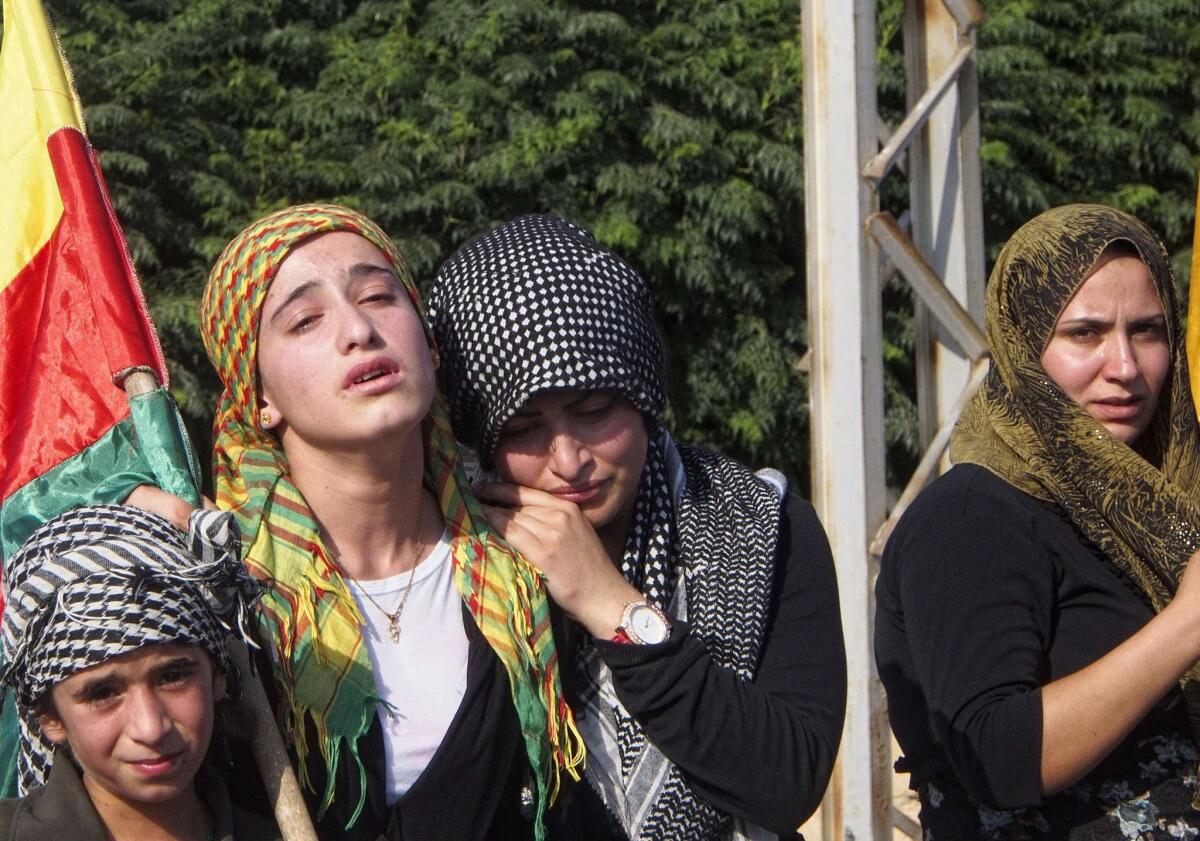A dilemma for Syria’s minorities

- Share via
The Obama administration — with the backing of key Republicans in Congress — is poised to embark on a strategy that entails punitive airstrikes on Syrian government positions and stepped-up lethal aid to moderate elements of the Syrian opposition.
So far, however, the Syrian opposition has been unable to win significant support from the country’s ethnic and religious minorities. Without such support, the opposition is unlikely to prevail even with stepped-up U.S. assistance. Moreover, the inability of the Syrian rebels, who are almost all Sunni Muslim Arabs, to win over the country’s Kurds, Alawites and Christians raises the question of whether their victory is even desirable.
Over the last year, I have met with Kurdish, Christian and Alawite representatives as part of an effort to help prepare them to negotiate for their communities in a post-Bashar Assad Syria. I have been struck by the sense of unease they all feel about what may follow in Syria. (By most estimates, each group is about 11% of Syria’s population, although Christian numbers have dropped in recent years and Kurdish numbers have risen.)
As a group, the Alawites have the most to lose. Although the Alawites consider themselves Muslims, many Sunnis consider them to be apostates, and they were long a marginalized community in Syria, living in impoverished villages in the Alawite mountains north of Lebanon. When the current president’s father, Hafez, became president more than 40 years ago, life changed significantly for his fellow Alawites. Today, they dominate the upper ranks of the military and security forces, and they provide the regime with its most reliable troops. Some Alawites would prefer a democratic, pluralistic Syria without Assad, but almost none believe this is possible.
“Christians to Beirut; Alawites to the grave” emerged early in the war as a slogan of anti-regime fighters. Since then, Alawite-led troops and Alawite militias have perpetrated massive atrocities against Sunni civilians, thereby ensuring that Syria’s Alawites will be targeted for retribution. If Assad falls, Syria’s Alawites know they face a likely genocide. Under these circumstances, they have no choice but to stick with the government.
Syria’s Christians have tried to stay out of politics, preferring to focus on business where many have done well, at least until the start of the civil war. They have no incentive to jeopardize their current well-being by supporting a rebellion that may not succeed. And they are understandably fearful of an opposition that includes the Al-Qaeda-linked Al Nusra Front. Because the Syrian diaspora is disproportionately Christian, Christians have found it easier to immigrate to the West, and many have done so since the uprising began.
Syria’s largest minority is the Kurds, and their case is the most curious. Unlike the Alawites and Christians who have done well under the Assads, the Kurds have been brutally repressed. Kurdish areas in the northeast and northwest are among Syria’s poorest (although resource rich) and, since the 1950s, successive Syrian regimes have denied citizenship documents to hundreds of thousands of Kurds, saying they are migrants from Turkey.
In 2004, Kurds in the western Syrian city of Qamishli staged their own uprising against the regime, tearing down billboards and statues of the current president and his late father. The uprising was put down with characteristic Assad ruthlessness.
But today, Syria’s Kurdish militias are fighting anti-regime Islamic radicals who have been attacking Kurdish villages. The Syrian government is largely absent from the Kurdish area, and in July, the Kurds proclaimed their own autonomous region. They are now focused on making that autonomy a reality, securing their region’s borders against Sunni rebels, establishing a Kurdish language curriculum in schools, changing license plates and setting up a Kurdish administration.
The Syrian opposition has not even tried to win the support of the country’s minorities. There is no program, or even meaningful discussion, of how a post-Assad regime might protect Syria’s Alawites from retribution. The Kurds are unwilling to fight for an opposition that says future arrangements for the Kurds will be decided democratically — in other words, by a Sunni Arab majority that has never shown any sympathy for Kurdish linguistic and citizenship rights, much less for their demands for regional autonomy. Nor has the opposition acknowledged or addressed the fears of Syria’s Christians.
Twenty-five years ago this month, I led a Senate Foreign Relations Committee staff mission that went along the entire Iraqi-Turkish border documenting the use of chemical weapons against Iraq’s Kurds. These are horrific weapons, and their use demands a response.
But the United States should be cautious about a strategy involving military support, including airstrikes and arms supplies, to a Syrian opposition that has neither the ability nor the inclination to reach out to Syria’s minorities. Such a strategy is not likely to succeed and, more important, we may not want it to succeed.
Peter W. Galbraith is a former U.S. ambassador and the author of two books on the Iraq war.
More to Read
A cure for the common opinion
Get thought-provoking perspectives with our weekly newsletter.
You may occasionally receive promotional content from the Los Angeles Times.










